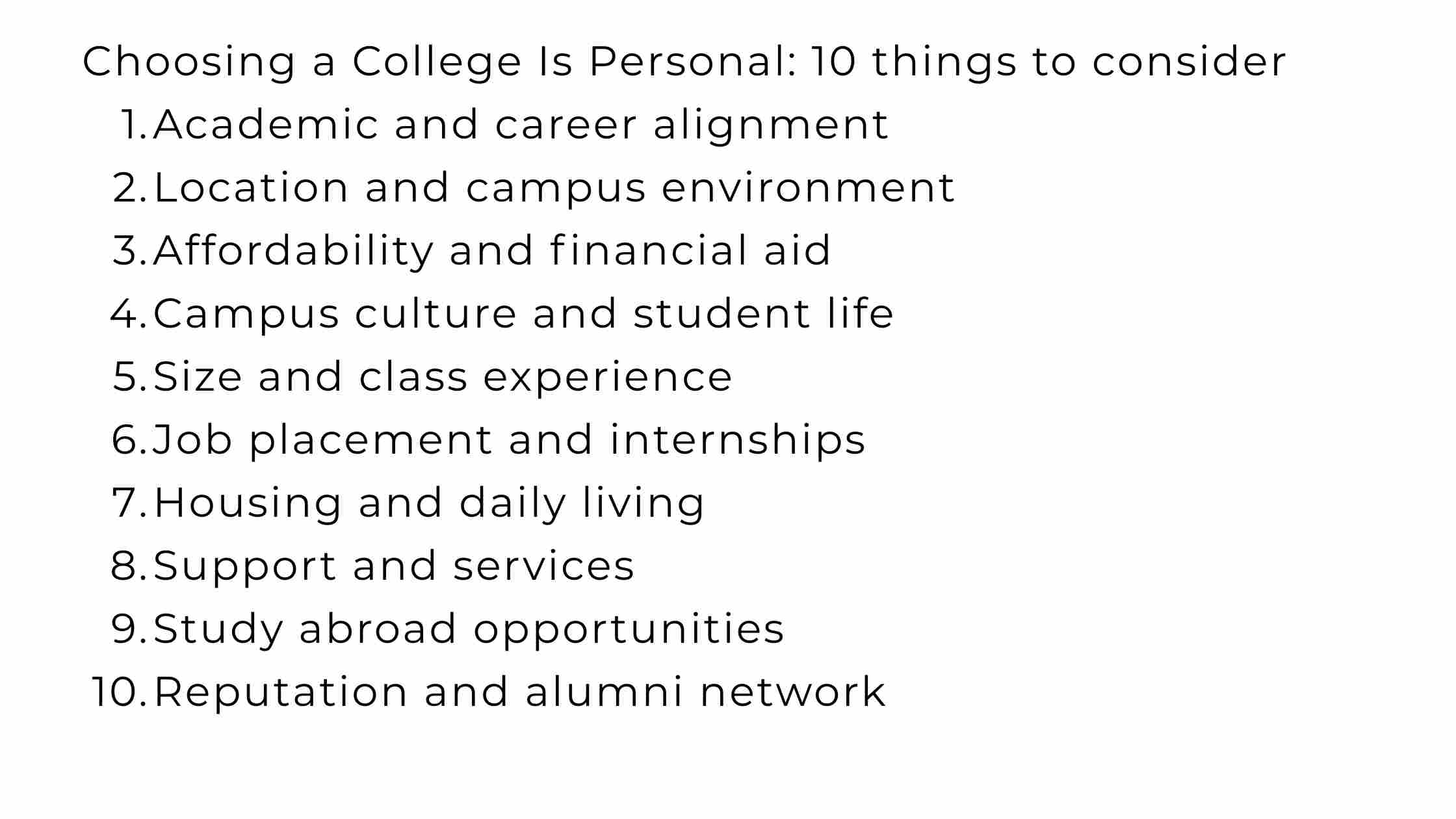
10 Things to Consider When Choosing a College
Choosing a college is one of the biggest decisions you’ll make—not just for your education, but for your future. It’s exciting, overwhelming, and sometimes downright confusing.
Maybe you’re asking, “How do I even know what to look for in a college?”
Or “Does it matter more where I go or what I do there?”
Read our blogs on why school is important and reasons not to take a master degree
I’ve helped friends, siblings, and even younger coworkers wrestle with this question. And if I had to summarize what I’ve learned into one simple truth, it’s this:
The best college for you is the one that fits your goals, your lifestyle, and your future—not someone else’s expectations.
So let’s dive into the 10 things to consider when choosing a college, and break it down in a way that actually helps you decide with confidence.
1. Your Academic and Career Goals
First things first: What do you want to study?
Even if you’re undecided, you should look at schools with strong programs in areas you’re curious about.
Ask yourself:
- Does the college offer my major?
- Are the professors respected in that field?
- Does it lead to the kind of job I want?
If your dream is to be an engineer, a school known for liberal arts might not serve you best—and vice versa.
2. Location and Environment
Where the college is matters more than most people admit.
- Do you prefer a city, suburb, or rural campus?
- How far from home do you want to be?
- Are you okay with snow… or heat?
Think about your lifestyle. Would a quiet, nature-filled environment help you focus? Or do you need the buzz of a big city?
Sometimes, the setting can make or break your experience.
3. Cost and Financial Aid
Here’s the hard truth: college is expensive.
But the sticker price isn’t the whole story. Many private colleges offer generous scholarships. Some public schools have great in-state tuition.
Things to consider:
- Can you afford the tuition and living expenses?
- What’s the average debt students graduate with?
- Are there scholarships, work-study, or grants available?
Don’t choose a college just because it’s expensive—choose it because it’s worth it.
4. Campus Culture and Student Life
Let me tell you something I wish I knew earlier:
You’re not just picking a school—you’re picking a community.
Pay attention to:
- Clubs, activities, sports, and Greek life
- Diversity and inclusivity on campus
- The “vibe” during a campus visit or tour
Ask yourself: Do I feel like I’d belong here?
Because four years is a long time to feel out of place.
5. Size of the School
Size matters—especially in college.
Large universities have big classes, more majors, and wider networking.
Smaller colleges often offer close-knit communities and more personalized learning.
Consider:
- Do you want to be one of 500 in a lecture hall?
- Or one of 15 in a discussion-based seminar?
I’ve seen students thrive in both—just depends on what works for you.
6. Opportunities for Internships and Job Placement
College isn’t just about books. It’s about building a bridge to the real world.
Ask about:
- Internship programs
- Career fairs and employer partnerships
- Alumni success and job placement rates
A great college doesn’t just educate you—it connects you to what’s next.
7. Housing and Living Options
Don’t overlook where you’ll actually live.
Some things to think about:
- Are freshmen guaranteed housing?
- What are the dorms like?
- Can you live off-campus later?
Comfortable, safe housing can make a huge difference in your day-to-day life.
8. Support Services and Resources
Let’s be honest: college can be hard—academically, emotionally, and socially.
Great schools offer support like:
- Academic advising and tutoring
- Mental health counseling
- Disability services
- Career coaching
Don’t underestimate the power of having people and resources to help you through the rough patches.
9. Study Abroad and Exchange Programs
Want to see the world while earning your degree?
Then ask:
- Does the school offer global study programs?
- Are the credits easy to transfer back?
- What’s the cost of studying abroad?
Even if you’re not sure now, having the option is a big plus.
10. Reputation, Rankings, and Alumni Network
Yes, prestige can matter—but it shouldn’t be the only reason.
Look into:
- The school’s overall reputation
- How its alumni are doing after graduation
- Whether it’s respected in your intended field
Remember: a college with a strong network can open doors long after you graduate.
Choosing a College Is Personal
Let’s recap the 10 things to consider when choosing a college:
- Academic and career alignment
- Location and campus environment
- Affordability and financial aid
- Campus culture and student life
- Size and class experience
- Job placement and internships
- Housing and daily living
- Support and services
- Study abroad opportunities
- Reputation and alumni network
Take campus tours. Talk to current students. Ask questions. And trust your gut.
Because the best college isn’t always the highest-ranked one—it’s the one where you will grow, thrive, and feel at home.
Cite this article
You can copy and paste your preferred citation format below.
Martin, L. & Arquette, E.. (2025, May 1). 10 Things to Consider When Choosing a College. Coursepivot.com. https://coursepivot.com/blog/10-things-to-consider-when-choosing-a-college/



